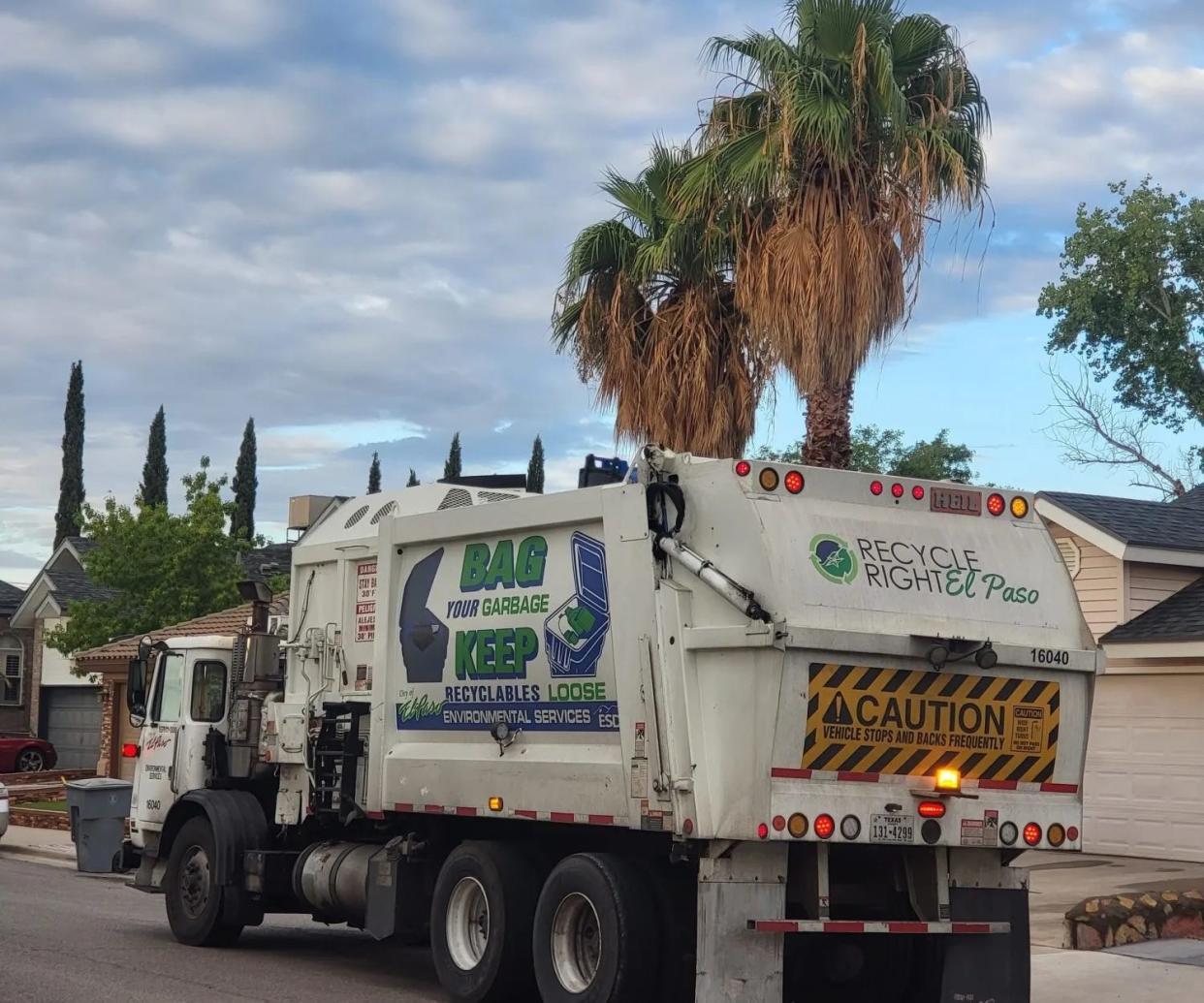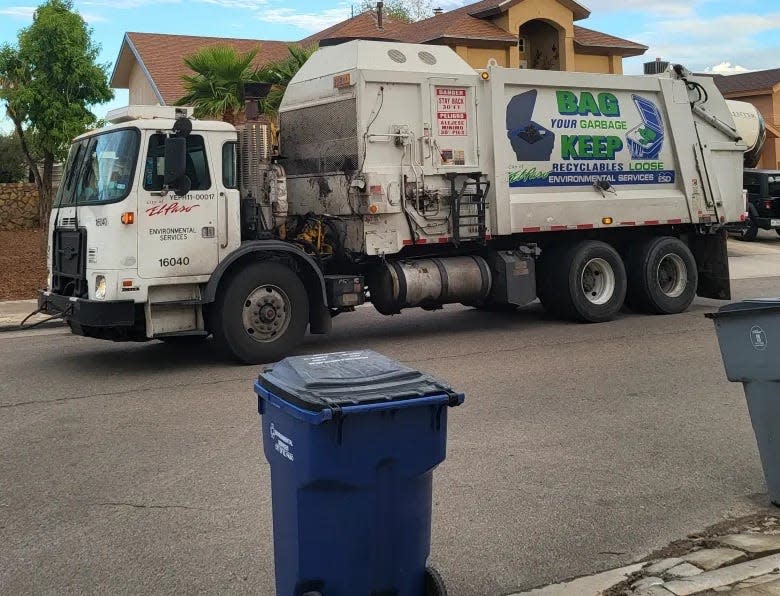El Paso recycling improves under new operator; city pushes education on what’s recyclable

Five years after an internal audit found that El Paso’s curbside recycling program had “not been successful” over its first decade, city officials said the program now is saving more space in local landfills – a year-and-a-half after a new company took over the operation.
Even after the critical 2018 audit, the city’s recycling program was dogged by different problems in more recent years. The city stopped picking up the blue household recycling bins for three months in late 2020 because of a staffing shortage. And when the city resumed collecting recyclables in early 2021, over a third – 34% – of everything collected from the blue bins was not recyclable and the city had to pay to send it to a landfill.
But so far this year, the so-called contamination rate, or the percentage of items in recycling bins that aren’t recyclable, has fallen to about 24%. That’s just a bit higher than the goal city officials set a couple of years ago to drive recycling contamination in El Paso down to 23% by the end of 2023.
The city’s recycling contamination rate “affects us greatly,” said Scott Berry, the district manager for Waste Connections, a publicly-traded company that owns a recycling facility in the Northeast.
More: Mom of toddler who drowned at El Paso's Camp Cohen Water Park arrested
“The lower (contamination) the better, because that means we’re getting better product out of what’s brought to us that we can actually market and sell,” Berry said. “The more contamination you have, the more cost it is to us. We have to haul the trash off.”
Waste Connections – which has nearly 20,000 employees nationwide and is valued at $35 billion – bought the El Paso recycling facility from Friedman Recycling in early 2022, along with another recycling operation in Albuquerque. The company does business in the two cities under the name BARCO, and the city of El Paso transferred the recycling contract it had with Friedman to BARCO in March of last year.
Waste Connections also owns El Paso Disposal, the waste management company that picks up household garbage here, and the Camino Real landfill in Sunland Park.
The drop in recycling contamination was a result of the city’s educational program designed to show El Pasoans what’s recyclable and what isn’t, said Nicholas Ybarra, assistant director of the city’s environmental services department.
Lithium batteries are the first thing Berry urges El Pasoans not to throw in their blue recycle bin – and that includes e-cigarettes that run on lithium batteries. That’s because they can heat up and start a fire relatively easily, he said.
Workers at BARCO’s facility also sometimes find bullets tossed in with paper and cardboard.
“And these aren’t ones that are spent casings. They actually still have gunpowder,” Berry said.
There were at least three fires at the recycling facility between 2013 and 2019 when Friedman still owned the building. But after BARCO took over the city’s recycling program, the company spent $500,000 to install a computerized system that uses a sensor to detect heat when trucks dump recyclables off. If the sensor sees a hot spot, it has a water cannon to put a fire out.
However, when BARCO employees have to haul non-recyclable items to the landfill, the city picks up the tab – so there’s a cost to throwing the wrong things in your recycle bin. The city last year paid BARCO $196,000 to handle contaminated waste, and through August this year the city paid the recycler about $150,000 for contamination, Ybarra said.
But the city has had some success slashing the amount of contaminated waste that gets hauled to BARCO’s recycling center, which employs 38 workers. Major non-recyclable items include: styrofoam and plastic bags, grocery bags, yard waste, food and liquids, and bagged recyclables. Ybarra, however, said residents must bag shredded paper in order for it to be recyclable; otherwise, paper shreds scatter around the recycling center near Railroad Drive, he said.

New recycling customers in El Paso have to complete a brief course on what not to recycle before the city will drop a blue bin at their home. When the program got off the ground in 2006, the city simply left a blue bin at every household with an instructional pamphlet.
The city also offers its recycling Black Belt, where city employees will check a household’s recycling bin and award some swag if the resident placed the right items in the bins. Ybarra said 1,508 El Pasoans graduated from the Black Belt course, and another 819 people are enrolled.
BARCO receives between 24,000 and 26,000 tons of recyclables at its El Paso facility each year, Ybarra said. That material would otherwise be dumped in a local landfill if the city didn’t operate the recycling program.
“The contamination that they receive at BARCO, that goes directly to our landfill,” Ybarra said. “It has gone down.”
BARCO’s operation converts cardboard into toilet paper and toilet paper rolls, and plastic bottles into carpet lining, for example. Much of what the recycler produces in El Paso is sold through a broker and often goes to places in the southeastern U.S., such as Georgia and Louisiana. BARCO also sends some of its recycled material to paper mills in Juarez, Berry said.
Although glass is commonly recyclable in other U.S. cities, Berry said there’s not much of a market for recycled glass in the southwestern U.S. Separately, the city accepts recycled glass that residents can drop at collection facilities around El Paso – where the glass is pulverized and then available for use by anyone – but residents can’t throw glass in the curbside recycle bin.
“I just don’t think, right now, there’s a viable market for (recycled glass). Not here, directly within the southwest area,” Berry said. “It’s not to say we wouldn’t get to that point someday. It’s just finding the right market, and finding the right equipment to do it safely.”
Berry said El Paso has become a “vertically-integrated market” for Waste Connections. The company now owns much of the waste management supply chain in the city: waste collection, recycling and a major landfill.
“From the company’s perspective, this is what they look for as far as working on the goals of sustainability,” Berry said. “So this was a good purchase for us.”
This article originally appeared on El Paso Times: City pushes education on what’s recyclable

